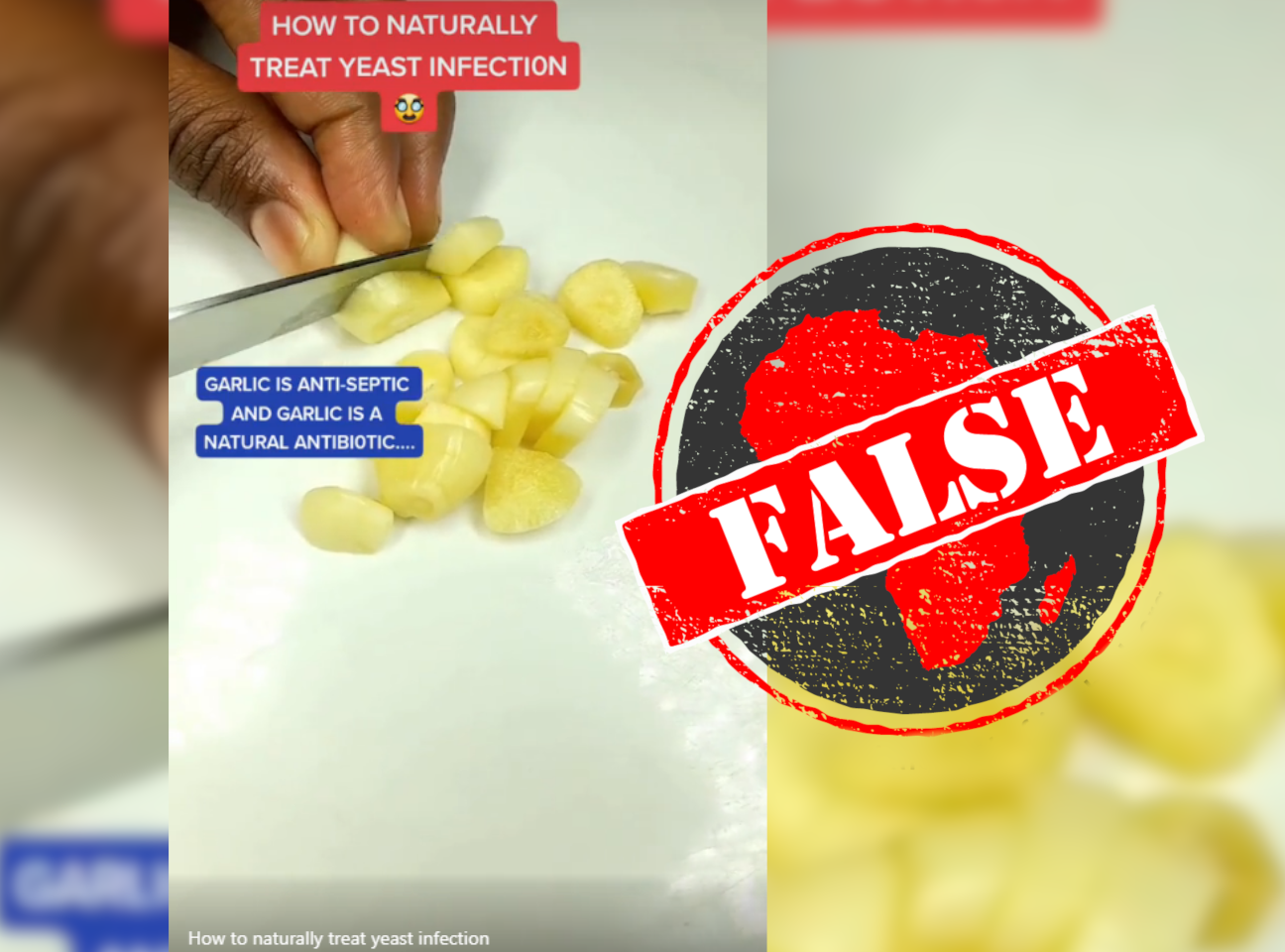IN SHORT: Garlic is a common ingredient in home remedies, and has been shown to have some medicinal properties. But there is conflicting evidence and not enough research to say it can treat yeast infections.
A video claiming that garlic water can treat a yeast infection has been circulating on Facebook in June 2023. The video quickly racked up over 90,000 views.
The poster claims to be Kenya-based surgeon, one Dr Joe M Mangaji, whose account has 63,000 followers. The claim also appeared in similar posts here, here, here, here, and here, some linking to an article posted on a “home remedies” website.
In the video, titled “How to naturally treat yeast infection”, a narrator gives instructions over footage of someone making the infusion. The instructions call for boiling four chopped garlic cloves in two cups of water for five minutes, and then letting the mixture cool and adding a teaspoon of honey.
The video ends with the narrator asking people to “click the link in my bio” to learn how to make their own natural remedies. It doesn’t, however, say what to actually do with the mixture once it is made, an omission that left multiple commenters asking whether they were meant to drink it. But the video was still liked over 600 times.
But is there any truth to Dr Mangaji’s health advice? Can you really treat a yeast infection with garlic-infused water? We checked.

What are yeast infections?
Yeast is a fungus found on skin, in the digestive system and in the vaginal area. Sometimes, a high concentration of yeast in one of these areas can cause an infection, called candidiasis. This is common in the vagina, as a vaginal yeast infection, but can also occur around or inside other body parts, like the mouth, throat, penis, nails, or navel.
A vaginal yeast infection generally causes intense discomfort in the form of itchiness and irritation of the vulva and vagina, along with unusual vaginal discharge. According to Mayo Clinic, three quarters of women develop this infection at some point, and many have repeated infections.
Johns Hopkins Medicine says that although anybody can get a yeast infection, they often occur in people with weakened immune systems, like those with HIV, or people who are on cancer treatment or taking antibiotics. Yeast overgrowth often happens in warm or humid conditions. Vaginal yeast infections occur when there is not enough healthy vaginal bacteria to keep the yeast numbers in control. This can also result from hygiene practices like using harsh or scented soaps, or douching.
Garlic and yeast infections
Garlic has long been used in traditional medicine systems for various infections because of its antibiotic, antifungal and antiviral properties.
More recently, scientists have researched garlic’s effects on vaginal yeast infections. For example, a 2015 study compared garlic supplement tablets to fluconazole, a scientifically proven treatment. The authors found that garlic did improve overall symptoms. And a 2010 study found a garlic and thyme cream worked about as well as an antifungal cream, but this study had a few methodological problems.
But another study, which was a randomised, controlled trial (considered a more rigorous design), found no difference between garlic tablets and the placebo group, where no active medicine was taken. There was no difference in concentration of the yeast or symptoms but the garlic tablet group reported more negative side effects.
So there isn’t enough research to say whether garlic, as extracts in tablet form or in whole form, could treat yeast infections. And garlic has been known to cause side effects like heartburn, upset stomach and body odour. Garlic supplements might also increase risk of bleeding or make some medications less effective.
Using a natural remedy without a medical diagnosis could also mean you miss the signs of a more serious illness – yeast infection symptoms are similar to some serious infections. Two out of three people who get medication for a yeast infection don’t have one, according to the US Office on Women’s Health.
It is recommended that you seek proper medical advice, before relying on an unproven home remedy.
Republish our content for free
For publishers: what to do if your post is rated false
A fact-checker has rated your Facebook or Instagram post as “false”, “altered”, “partly false” or “missing context”. This could have serious consequences. What do you do?
Click on our guide for the steps you should follow.
Publishers guideAfrica Check teams up with Facebook
Africa Check is a partner in Meta's third-party fact-checking programme to help stop the spread of false information on social media.
The content we rate as “false” will be downgraded on Facebook and Instagram. This means fewer people will see it.
You can also help identify false information on Facebook. This guide explains how.


Add new comment